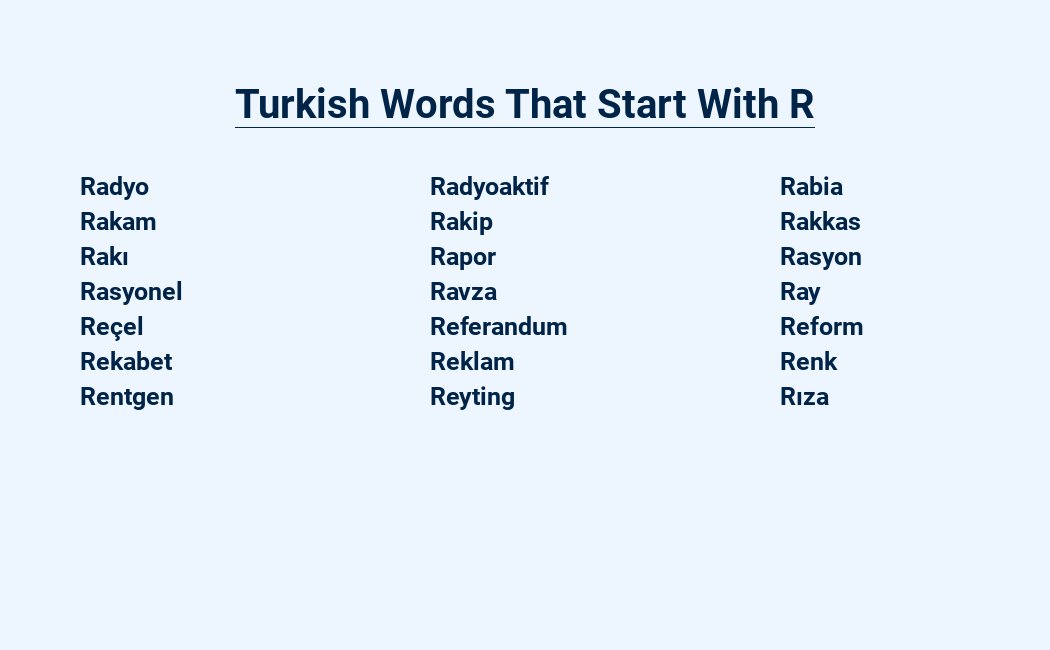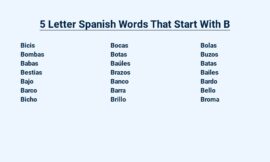Embark on a linguistic journey through Turkish vocabulary, where words beginning with the letter “R” await discovery. From the comforting embrace of “rahat” (comfortable) to the captivating allure of “rastgele” (random), these terms paint a vibrant tapestry of emotions, objects, and concepts.
Let’s delve into the world of Turkish words starting with “R” and uncover their nuances and significance.
| Word | Meaning |
| Rahat | Comfort, ease |
| Rakı | Turkish alcoholic spirit |
| Rapor | Report |
| Rastlantı | Coincidence, chance |
| Rağmen | Despite, in spite of |
| Ruh | Soul, spirit |
| Rüya | Dream |
| Rüzgar | Wind |
Radde: Degree, level, or extent.
Radyo: Radio, a device that transmits and receives radio waves.
Raf: A shelf, a flat surface fixed to a wall or other upright surface for storing objects.
Rakam: A numeral, a symbol used to represent a number.
Rakip: A competitor, a person or team competing against another in a contest or competition.
Rakipsiz: Unrivaled, having no equal or competitor.
Rakiplik: Rivalry, competition between two or more parties seeking the same goal or prize.
Rapor: A report, a formal statement of facts or findings, usually written.
Raptiye: A paper clip, a small metal clip used to hold papers together.
Rastgele: Random, happening or done without order or purpose.
Rastlantı: Chance, a fortuitous occurrence or event.
Rastlantısallık: Randomness, the quality or state of being random.
Rağmen: Despite, in spite of.
Rahat: Comfortable, free from pain or discomfort.
Rahatlık: Comfort, the state or quality of being comfortable.
Rahatlatıcı: Relaxing, causing relaxation.
Rahatsızlık: Discomfort, a feeling of physical or mental uneasiness.
Rahatlık: Comfort, the state or quality of being comfortable.
Rahatlatıcı: Relaxing, causing relaxation.
Rahatsızlık: Discomfort, a feeling of physical or mental uneasiness.
Rahmet: Mercy, compassion, or kindness.
Rahvan: A type of horse gait, a slow, smooth, and comfortable walk.
Ramazan: The ninth month of the Islamic calendar, observed as a period of fasting.
Randevu: An appointment, a scheduled meeting or gathering.
Rant: Rent, a periodic payment made for the use of property or land.
Rasyonel: Rational, based on or in accordance with reason or logic.
Rasyonellik: Rationality, the quality or state of being rational.
Ray: A rail, a metal track on which trains or trams run.
Rayiç: The current market price or value of a property or asset.
Reaktör: A reactor, a device in which a chemical or nuclear reaction takes place.
Reçete: A prescription, a written order from a doctor or other healthcare provider for a medication or treatment.
Reform: A reform, a change or improvement in a system or institution.
Reformcu: A reformer, a person who advocates or brings about reform.
Refüj: A refuge, a place of shelter or protection.
Referandum: A referendum, a vote in which the electorate is asked to decide on a particular issue or proposal.
Refleks: A reflex, an automatic and involuntary response to a stimulus.
Rekabet: Competition, the act or process of competing.
Rekabetçi: Competitive, characterized by or involving competition.
Reklam: An advertisement, a message intended to promote a product or service.
Reklamcı: An advertiser, a person or company that creates or places advertisements.
Reklamcılık: Advertising, the activity or business of creating and placing advertisements.
Reklamveren: An advertiser, a person or company that pays for the placement of advertisements.
Rekor: A record, the best or highest achievement in a particular field or category.
Rekorcu: A record holder, a person who holds a record.
Rektör: A rector, the head of a university or college.
Rekzet: A rejected consonant in the Turkish alphabet, represented by a dot placed above the consonant.
Reşit: Of legal age, having reached the age at which a person becomes legally responsible for their actions.
Reşitlik: Legal age, the age at which a person becomes legally responsible for their actions.
Resim: A picture, a representation of a person or object on a surface.
Resmi: Official, authorized or recognized by an official body.
Turkish Words That Start with R
Rahat
Rahat is a Turkish word meaning “comfort” or “ease.” It is often used to express a feeling of contentment or relaxation. The word is derived from the Arabic word “rahat,” which has the same meaning.
Rahat can also be used to describe something that is comfortable or easy to use.
Rahatlatıcı
“Rahatlatıcı” is a Turkish word that means “relaxing” or “soothing”.
It is often used to describe a person, place, or activity that has a calming effect.
For example, one might say “Bu müzik çok rahatlatıcı” (“This music is very relaxing”) or “Bu oda çok rahatlatıcı bir atmosfere sahip” (“This room has a very relaxing atmosphere”).
Rahatlık
Rahatlık translates to “comfort” in English. It encompasses a sense of well-being, ease, and contentment.
Whether it’s physical relaxation or mental tranquility, rahatlık is a highly sought-after state that contributes to overall happiness and life satisfaction.
Rahatsızlık
Rahatsızlık is a Turkish word meaning discomfort, unease, or annoyance.
It can describe physical or mental distress and is often used to refer to a feeling of restlessness or agitation.
The word is derived from the Arabic word rahat, meaning “comfort” or “ease.”
Rakam
Rakam (number) is a commonly used word in Turkish.
It is often used in mathematical contexts, but it can also be used in everyday conversations to refer to a quantity or amount.
For example, “iki rakam” means “two numbers”.
Rakip
Rakip is a Turkish alcoholic beverage made by distilling grapes and anise. It is similar to ouzo, a Greek spirit, and has a strong, licorice-like flavor.
Rakip is often served with water or ice and is a popular drink in Turkey, Greece, and other parts of the Mediterranean region.
Rakipsiz
Rakipsiz, meaning “unrivaled” or “peerless” in Turkish, captures the essence of something that stands out as exceptional and unmatched. It conveys a sense of superiority and uniqueness, highlighting the absence of any competition or comparison.
Rakipsiz embodies the idea of being the best of its kind, leaving no room for rivals or equals.
Rakiplik
Rakiplik is a Turkish word that refers to rivalry, competition, or opposition. It is often used in the context of sports, business, or politics.
The word is derived from the Arabic word “raqaba,” which means “to watch” or “to observe.”
Rapor
Rapor, meaning ‘report’ in Turkish, is a document presenting information in a structured and organized manner. It often includes data analysis, findings, and recommendations.
Raporlar are used in various fields, including business, education, and research, to convey information clearly and effectively.
Raptiye
Raptiye, meaning “stapler” in Turkish, is a versatile tool used to bind papers together. Its compact size and ease of use make it a staple in offices and homes for organizing and securing documents.
Rastgele
Rastgele, meaning “random” or “at random,” is a commonly used Turkish word with diverse applications. It can be used as an adverb, adjective, or noun, adding an element of unpredictability or chance to various contexts.
Rastlantı
“Rastlantı” signifies “coincidence” or “chance occurrence” in Turkish. It captures the notion of unexpected events or occurrences that transpire by chance or happenstance.
Rastlantısallık
“Rastlantısallık” translates to “randomness” in English. It encompasses the unpredictable nature of events and outcomes, capturing the idea of chance and the absence of a discernible pattern or order.
Rağmen
Rağmen (despite), a Turkish word used to emphasize the continuation of an action or situation regardless of an obstacle or difficulty.
Rahat
“Rahat” translates to “comfort” or “ease” in Turkish, capturing a sense of tranquility and well-being.
It evokes a state of relaxation, contentment, and freedom from worry or stress.
“Rahat” is commonly used to express feelings of comfort or to describe a pleasant and peaceful state of mind.
Rahatlık
Rahatlık translates to comfort, ease, or convenience in English. It encompasses a state of physical, mental, or emotional well-being, often associated with the absence of discomfort, pain, or stress.
Rahatlık can be experienced in various aspects of life, such as a comfortable living environment, a stress-free job, or a peaceful state of mind.
Rahatlatıcı
“Rahatlatıcı” is a Turkish word that captures the essence of relaxation and tranquility. It describes a state of serenity, calmness, and relief from stress or tension.
Whether it’s a soothing melody, a peaceful retreat, or a comforting embrace, “rahatlatıcı” embodies the feeling of being at ease and finding solace in the midst of life’s challenges.
Rahatsızlık
“Rahatsızlık” in Turkish means “discomfort, uneasiness, or disturbance.” It can refer to physical discomfort, emotional distress, or inconvenience caused by various factors.
The word is often used to describe a state of being where one feels unsettled, troubled, or agitated.
Rahatlık
“Rahatlık” is a Turkish word that conveys a sense of comfort, ease, and relaxation. It encompasses physical well-being, mental tranquility, and a state of contentment.
“Rahatlık” is often associated with moments of leisure, unwinding, and finding solace in the simple pleasures of life.
Rahatlatıcı
Rahatlatıcı is a Turkish word that means “soothing” or “calming.” It can be used to describe a person, place, or thing that has a calming effect. For example, one might say, “The gentle music was very rahatlatıcı.”
Rahatsızlık
Rahatsızlık means “discomfort” or “uneasiness” in Turkish. It can be used to describe a physical or mental state of discomfort or a situation that causes discomfort.
The word is derived from the Arabic word “rahat,” which means “comfort” or “ease.”
Final Verdict
The Turkish language offers a plethora of words beginning with the letter “r,” each possessing unique nuances and applications. From expressing comfort, relaxation, and ease with terms like “rahat” and “rahatlık,” to conveying numerical concepts, competition, and happenstance through words like “rakam,” “rakip,” and “rastgele,” the range of vocabulary is vast.
Exploring these words further opens up avenues for deeper understanding of Turkish linguistic intricacies and effective communication in various contexts.




